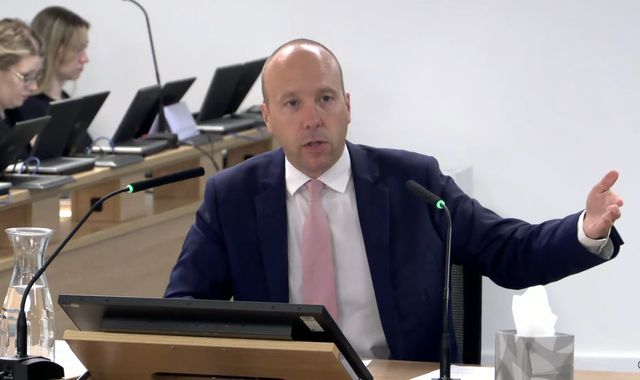Speaking at the inquiry into the government’s handling of the crisis, Mr Hancock said discharging patients from hospitals to care homes in the early stages of the pandemic was “the least-worst decision” at the time.
“It was formally a government decision,” he added. “It was signed off by the prime minister. It was really driven by Simon Stevens, the chief executive of the NHS, but it was widely discussed.
“Nobody has yet provided me with an alternative that was available at the time that would have saved more lives.”
When the pandemic hit in early 2020, hospital patients were rapidly discharged into care homes in a bid to free up beds and prevent the NHS from becoming overwhelmed.
But there was no policy in place requiring patients to be tested for COVID before admission, or for asymptomatic patients to isolate, until mid-April – despite growing awareness of the risks of people without symptoms spreading the virus.
The High Court ruled in 2022 that government policies on discharging hospital patients into care homes at the start of the pandemic were “unlawful”.
Nicola Brook, a solicitor for more than 7,000 families from COVID-19 Bereaved Families for Justice UK, said Mr Hancock’s claim that the policy had been the least-worst decision available was “an insult to the memory of each and every person who died”.
She added: “He knew at the time that many care homes did not have the ability to isolate the people who would be discharged from hospital and that COVID was airborne.”
‘We were in bleak circumstances’
Mr Hancock, who offered no apology at the inquiry, became health secretary in 2018.
He resigned from the Conservative government in 2021 after admitting to breaking social distancing guidance by having an affair with a colleague.
He added: “We were trying to do everything that we possibly could, we were in bleak circumstances.”
The inquiry has previously heard there were more than 43,000 deaths involving the virus in care homes across the UK between March 2020 and July 2022.
A civil servant was quoted earlier this week describing the figure as a “generational slaughter within care homes”.
Read more from Sky News:
‘Catastrophic failure’ led to Heathrow power outage
No 10 backs Reeves and says she is ‘going nowhere’
‘Would my dad still be alive?’
Sharon Cook, whose parents were living in a care home when the pandemic struck, said there was a “lot of confusion” about the guidance at the time.
She told Sky News her mother tested positive for COVID and died three days later.
She was allowed into the care home to tell her father, who had dementia, but after one visit, she was prevented from returning.
A week later, her father died and when she went to the care home, she was told they had not attempted to resuscitate him.
When she asked why, they showed her a DNAR (Do Not Attempt Resuscitation) form, which, they said, “had been in consultation with me”.
“If they’d been using the proper form, a more up-to-date form, I would have had to countersign,” she said.
“So I would have seen that, and then I could have exercised his right to have a second opinion.
“So I’ll never know if he would have survived, or not, but there was certainly a lot of confusion around care homes at the time that the guidance was being given.
“And when I went back three months later to discuss what had happened, they actually said, ‘oh, our mistake, we should have actually let you in.
“If I’d been let in, would my dad still be with me? I don’t know.”






























